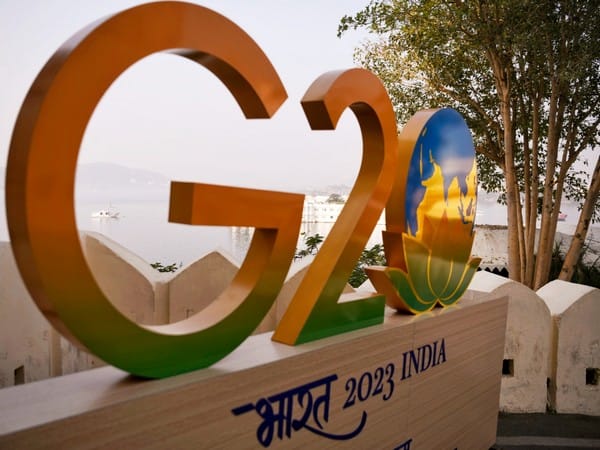New Delhi [India], September 3 (ANI): With the global economy facing uncertainty and instability in recent years vis-à-vis geopolitical developments, the role of the G20, as a platform connecting the world’s major developed and emerging economies, assumes greater significance in shaping the global trends.
India assumed the G20 Presidency on December 1 last year with an opportunity to bring more focus on the issues of critical global importance being the fastest-growing major economy among the leading economies.
A leading forum of the world’s major economies, G20 seek to develop global policies to address today’s most pressing challenges.
The G20 has 19 member countries and the European Union. The G20 grouping represents 90 per cent of global GDP and 80 per cent of global trade and 2/3rds of global population.
An analysis of GDP growth of the G20 Countries indicates that India is the growth leader in all the G20 countries.
India’s GDP growth rate for the years 2023 to 2026 (average) would be highest at 6.1 per cent followed by China at 4.4 per cent and Turkey at 3 per cent. Being the fastest-growing economy, India holds a great position to enhance its bilateral economic relations with the G20 countries.
The G20 is designated as the premier forum for international economic cooperation, has over the past two decades, formulated an agenda for strong, sustainable and balanced growth; strengthened the international financial regulatory system; reformed the mandate, mission and governance of the International Monetary Fund (IMF); deliberated on energy security and
climate change strengthened the support for the most vulnerable countries and placed quality jobs at the heart of the recovery.
Over the past 15 years, the G20’s agenda has expanded to include issues affecting the financial markets, trade, health care, education, anti-corruption, women’s development, skill building and youth promotion.
An analysis of India’s bilateral trade with G20 countries during the recent financial year 2022-23 indicates that the US is India’s largest trade partner in the G20 countries with USD 129 billion in merchandise trade of which India’s exports to US are USD 78.5 billion and Imports from the US are USD 50.9 billion with a trade surplus of USD 27.7 billion.
China is India’s second largest trade partner among the G20 countries with a total merchandise trade of USD 113.8 billion of which India’s merchandise exports to China are USD 15.3 billion and Imports from China are USD 98.5 billion with a trade deficit of USD
(-) 83.2 billion.
Saudi Arabia is India’s third largest trade partner in the G20 countries with a total merchandise trade of USD 49.9 billion of which India’s exports are USD 10.7 billion and Imports are USD 42 billion with a trade deficit of USD (-) 31.3 billion.
Russia is India’s fourth largest trade partner in the G20 countries with a total merchandise trade of USD 49.4 billion with India’s export worth USD 3.1 billion and Imports USD 46.2 billion leaving a trade deficit of USD (-) 43.1
billion.
The only regional group in the G20, the EU, is an important trade partner of India with a total merchandise trade of USD 135.9 billion with India’s exports to EU at USD 74.8 billion and imports from the EU at USD 61.1 billion leaving a trade surplus of USD 13.8 billion.
Overall, India has a USD 742.8 billion total merchandise trade with the G20 countries of which USD 287.8 billion are exports and USD 454.9 billion are imports with a trade deficit of USD (-) 167.2 billion.
Through the years, the G20 remained committed to the principles of “strong, sustainable, balanced and inclusive growth” with more and more improvement in the developmental indicators for better terms of trade, ease of doing business and state-of-the-art innovation systems.
An analysis of major lead indicators including ease of Doing Business and Global Innovation
Index indicates that India’s ease of Doing Business is ranked 15th among the G20 countries whereas Global Innovation Index, India is ranked 12th in the G20 countries.
India’s G20 Presidency is one of the most significant milestone moments of Indian democracy. It is widely felt that in times when there is a crisis of multilateralism, India has the responsibility for bringing stability to a deeply divided multipolar world and crafting broader global responses to the challenges.
During its Presidency, India has set the tone that the G20 must continue to fight the crisis of climate change and continue to send clear signals to decarbonize the economic systems. Also, G20 must do everything in its power to keep inflation within the range, and to protect the living standards for vulnerable people.
In a nutshell, the economic fundamentals of India are strong as compared with many of the G20 countries; India is the fastest-moving economy among the G20 nations and holds a trade surplus with eight G20 countries.
At this juncture, the time is most opportune to explore potential with capacity building at the domestic level with the expansion of production possibilities to enhance the size of the economy to the level of 3rd largest in the world economic system in the next few years and thereafter, a developed economy by 2047. (ANI)
This report is auto-generated from ANI news service. ThePrint holds no responsibility for its content.






